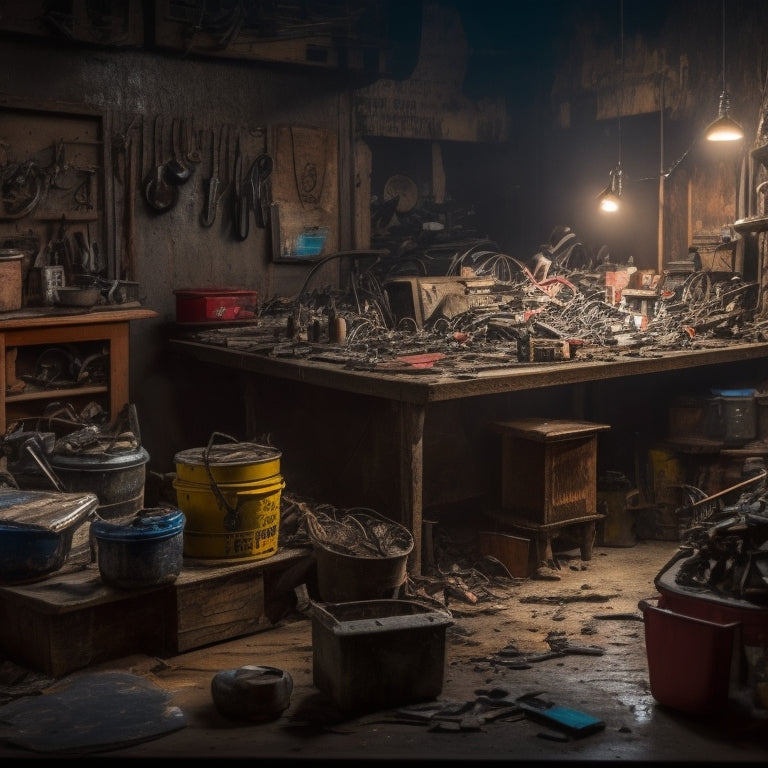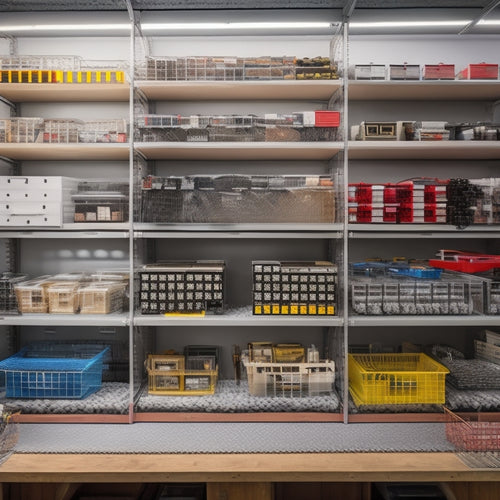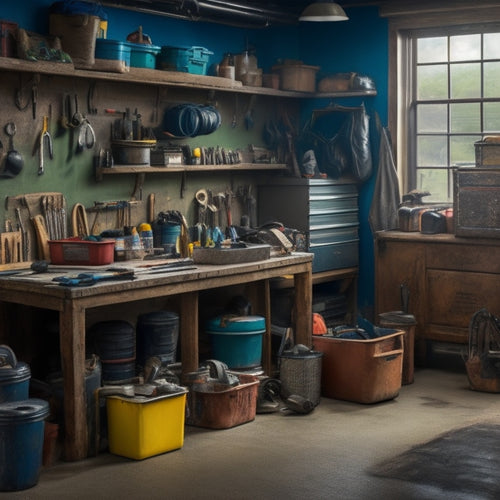
Why Cluttered Workshops Hold Your Shop Back
Share
You're likely no stranger to the frustration of misplacing tools, tripping over clutter, and wasting precious time searching for what you need. But did you know that cluttered workshops hold your shop back in more ways than just wasted time? They also increase safety risks, damage equipment and materials, and lead to inefficiencies in workflow processes. On top of that, cluttered workshops can cause increased frustration and stress, making it difficult to meet deadlines and goals. It's time to take control of your workshop - learn how to break free from the chaos and access your shop's full potential.
Key Takeaways
• Cluttered workshops lead to wasted time, decreased productivity, and reduced efficiency due to misplaced tools and disorganization.
• Disorganized workspaces pose safety risks, including hidden hazards, tripping hazards, and potential respiratory and skin issues.
• Misplaced items and tools cause project delays, impacting customer satisfaction and damaging your shop's reputation.
• Cluttered workshops lead to financial consequences, including revenue losses, additional costs, and severe financial repercussions.
• A cluttered workshop negatively impacts customer satisfaction, business image, and overall success, leading to a loss of trust and revenue.
Cluttered Workshops Affect Productivity
Every minute you spend searching for a misplaced tool or moving around clutter is a minute that's not spent on actual work, directly impacting your productivity. You know the feeling - you're in the middle of a project, but you can't find the right wrench or screwdriver. You waste precious time searching high and low, only to find it buried under a pile of unnecessary items.
This isn't just frustrating; it's also a significant productivity impact. Cluttered workshops can slow you down, causing you to miss deadlines and lose revenue.
On the other hand, an organized workshop can boost your productivity exponentially. When everything has its designated place, you can focus on the task at hand without interruptions. You'll complete projects faster, and with greater accuracy. The organization benefits are clear: you'll be more efficient, effective, and able to serve your customers better.
Safety Risks in Disorganized Spaces
When you're working in a cluttered workshop, you're not just dealing with a messy space - you're also putting yourself and others at risk.
You can't see what's lurking beneath the piles of tools and materials, and that's where hidden hazards are waiting to strike.
From tripping over cords to slipping on oil spills, the safety risks in disorganized spaces are very real and demand your attention.
Hidden Hazards Abound
Disorganized workshops are breeding grounds for accidents, and you're more likely to trip, slip, or fall in a cluttered space where tools and materials are scattered all over the floor. In a workshop where workspace organization is neglected, hidden hazards abound. You mightn't notice the loose wire on the floor or the sharp edge of a tool left on the workbench, but they're waiting to cause harm. Poor clutter management leads to a higher risk of electrical shock, cuts, and other injuries.
As you navigate through the clutter, you're more likely to knock over a paint can or a container of chemicals, causing a spill that can lead to respiratory problems or skin irritation. Additionally, a cluttered workshop can also lead to fires, as sparks from machinery or tools can ignite flammable materials.
Tripping Hazards Everywhere
As you navigate your way through a cluttered workshop, you're constantly dodging obstacles, from cords snaking across the floor to boxes stacked haphazardly, each one a potential tripping hazard waiting to send you tumbling. This setup is a recipe for disaster, and one misstep can lead to serious injuries, downtime, and lost productivity. You're not just risking your own safety, but also that of your employees and customers.
To prevent accidents and improve efficiency, implementing organizing solutions that prioritize safety measures is crucial. Start by designating a specific area for each task, ensuring that all necessary tools and materials are within easy reach.
Utilize storage bins and shelves to keep items off the floor, and label everything clearly to avoid confusion. Install cord organizers and cable ties to keep cords tidy, and establish a regular cleaning schedule to maintain a clutter-free workspace.
Time Wasted Searching for Tools
During a typical workday, you're probably spending more time than you realize scouring your cluttered workshop for misplaced tools and equipment. This wasted time adds up quickly, taking away from the actual work that needs to be done. Not only does it frustrate you, but it also holds your shop back from reaching its full potential.
Tool organization is key to efficiency improvement. When everything has its designated place, you can quickly find what you need and get back to work.
Here are just a few ways a cluttered workshop is costing you time:
- You're constantly searching for misplaced tools, taking away from actual work time
- You're duplicating efforts, re-doing work because you can't find the right tool
- You're experiencing project delays, pushing back deadlines and impacting customer satisfaction
- You're feeling stressed and overwhelmed, affecting your overall well-being.
Damage Caused by Misplaced Items
When you can't find a tool, you're not just wasting time - you're also risking damage to your equipment, materials, and even your workshop itself. Misplaced items can lead to costly mistakes, like using the wrong tool for a job or accidentally damaging an essential piece of machinery.
Lost Tools Wasted Time
You've likely spent hours searching for misplaced tools, only to find them buried beneath a pile of scraps or hidden in a dusty corner of your workshop. The frustration and wasted time can be overwhelming. This is a common problem in cluttered workshops, where tool accountability is non-existent.
When tools aren't organized and easily accessible, you're left scrambling to find what you need, which can slow down your workflow.
To avoid this chaos, it's crucial to establish a workspace organization system that works for you. This includes:
- Assigning a designated spot for each tool and material
- Labeling storage containers and shelves
- Implementing a 'clean as you go' policy to prevent clutter buildup
- Conducting regular tool inventory checks to make sure everything is accounted for
Disorganized Storage Leads
A staggering number of projects are compromised by misplaced items that get damaged or destroyed in cluttered storage areas, causing unnecessary delays and added expenses. You've probably experienced it firsthand - you're in the middle of a project, only to realize that a critical component is nowhere to be found. You waste precious time searching for it, only to discover it's been damaged or destroyed, forcing you to reorder and wait for a replacement.
This is a common problem in cluttered workshops, but it's not inevitable. By implementing effective storage solutions and organizational strategies, you can avoid these costly setbacks.
Start by categorizing your items and assigning a designated storage space for each one. Label each area clearly, so you can quickly find what you need. Consider investing in shelving units, bins, and other storage solutions that keep your items off the floor and out of harm's way.
Inefficiencies in Workflow Processes
Disorganized workflows and unclear procedures consistently hinder your shop's productivity, causing frustration and wasted time. When you're struggling to find the right tools or materials, or when tasks are duplicated because of poor communication, it's evident that your workflow processes need an overhaul. By streamlining your workflows, you can optimize your workspace organization, reduce clutter, and improve efficiency.
Here are just a few ways you can identify and address inefficiencies in your workflow processes:
-
Identify bottlenecks: Pinpoint where tasks are getting stuck and develop strategies to overcome these obstacles.
-
Simplify tasks: Break down complex tasks into smaller, manageable steps to reduce confusion and errors.
-
Establish clear protocols: Develop and communicate clear procedures for tasks and projects to make certain everyone is on the same page.
- Implement workflow optimization tools: Utilize tools and software that help you manage tasks, track progress, and analyze workflows to pinpoint areas for improvement.
Increased Frustration and Stress
Two significant byproducts of cluttered workshops and inefficient workflow processes are frustration and stress, which can quickly demoralize your team and hinder their ability to perform at their best. When you're constantly searching for misplaced tools or dealing with disorganized workstations, it's easy to feel overwhelmed and anxious. This mental clutter can lead to a lack of mental clarity, making it difficult to focus on the task at hand.
To combat this, consider implementing organizing techniques that promote a sense of calm and control. Start by decluttering your workspace, getting rid of anything unnecessary or redundant. This will help reduce stress and anxiety, allowing your team to breathe a sigh of relief.
By creating a more organized and peaceful environment, you'll be amazed at how much more productive and efficient your team can be. Remember, a clutter-free workshop isn't only more efficient, but it's also better for your team's well-being.
Difficulty Meeting Deadlines and Goals
When you're stuck searching for lost parts or reworking sloppy assemblies, you're eating away at the time and resources needed to meet project deadlines and achieve business goals. This can lead to a ripple effect of negative consequences that impact your entire operation.
Here are just a few ways cluttered workshops hinder your ability to meet deadlines and goals:
-
Missed opportunities: When projects are delayed, you may miss out on new business or client opportunities that could take your shop to the next level.
-
Project delays: Cluttered workshops lead to project delays, which can damage your reputation and erode client trust.
-
Team setbacks: When team members are stuck dealing with clutter, they're not working efficiently, leading to decreased morale and productivity.
- Decreased morale: The stress and frustration that come with working in a cluttered environment can lead to burnout and decreased job satisfaction.
Higher Costs and Lost Revenue
As you struggle to meet deadlines and goals, you're likely piling up additional costs and sacrificing revenue in the process, further exacerbating the negative impact of a cluttered workshop on your bottom line.
The financial repercussions of a disorganized workshop can be severe, leading to revenue losses and inflated expenses. Every minute wasted searching for misplaced tools or materials is a minute that could've been spent on productive tasks, generating revenue.
Negative Impact on Customer Satisfaction
You're not just sacrificing your own productivity and revenue in a cluttered workshop - you're also risking the satisfaction of your customers. When your workshop is disorganized, it can lead to delays, mistakes, and miscommunications that can ultimately affect the quality of service you provide to your customers. This, in turn, can damage your shop reputation and negatively impact customer retention.
Here are just a few ways a cluttered workshop can harm customer satisfaction:
-
Delays and missed deadlines: A cluttered workshop can lead to lost or misplaced parts, tools, or equipment, causing delays and missed deadlines that can frustrate your customers.
-
Poor quality work: A disorganized workspace can increase the likelihood of mistakes, defects, or rework, which can compromise the quality of your work and lead to customer dissatisfaction.
-
Lack of transparency: A cluttered workshop can make it difficult to track progress, provide updates, or communicate with customers effectively, leading to mistrust and dissatisfaction.
- Unprofessional image: A cluttered workshop can create an unprofessional image, making customers question your ability to deliver high-quality work and eroding trust in your shop.
Frequently Asked Questions
How Do I Get My Employees to Maintain a Clean Workshop?
"Get your ducks in a row by introducing employee incentives and training programs that promote a clean workshop culture. Implement daily checklists and visual cues to keep everyone on track and maintain a tidy space that sparks productivity."
Can a Cluttered Workshop Affect Employee Morale and Job Satisfaction?
You know that a cluttered workshop can crush employee morale and job satisfaction, hurting productivity and mental health. A disorganized workspace can make your team feel overwhelmed, leading to burnout and decreased motivation.
Are There Any Tools or Software to Help Organize My Workshop?
You can tackle workshop disorganization with digital inventory management tools, like TradeGecko or Zoho, to track stock and supplies, and utilize software, such as Grapholith or WorkshopLayout, for workshop layout optimization to maximize space.
How Often Should I Schedule Workshop Cleanups and Maintenance?
"As you tackle workshop organization, coincidence has it that frequent cleanups boost employee engagement! Schedule maintenance every 2-3 weeks to maintain cleanliness and efficiency, ensuring your team stays motivated and productive."
Can a Cluttered Workshop Impact My Business's Insurance Rates?
You might be surprised to learn that a cluttered workshop can indeed impact your business's insurance rates. Disorganization can increase the risk of accidents, and insurers may view a cluttered space as a higher liability, affecting your rates.
Related Posts
-

Small Shelving Options for Tight Spaces
You're surrounded by tight spaces in your home, and you need clever shelving solutions that optimize storage without ...
-

10 Essential Steps for Small Parts Bin Storage
To optimize your small parts bin storage, start by defining your storage needs and goals, considering factors like av...
-

Best Cheap Tool Boxes for Budget-Conscious Buyers
You need a reliable tool box that gets the job done without breaking the bank. Look for durable materials, rust-resis...


